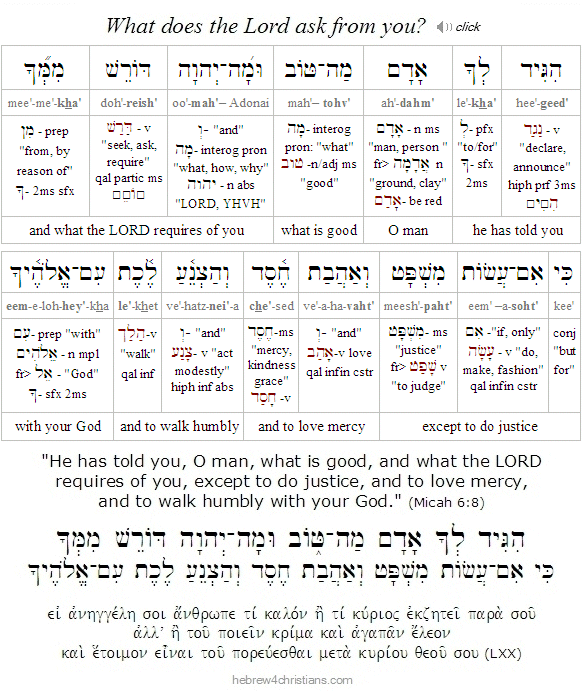|
The parable of the Pharisee and the Tax Collector is a well-known teaching of Yeshua. Two people go to the Temple to pray, one a devout Pharisee, and the other a despised tax collector. The Pharisee thanked God that he was not like other men (on account of his religious devotion), whereas the tax collector lamented that he was a sinner and simply appealed to God for mercy. The surprising "twist" to the story, however, is that the tax collector was justified in the eyes of heaven, and not the Pharisee (Luke 18:10-24).
Most people assume Yeshua told this story to teach how pride can deceive the heart, and that humility is essential to be rightly related to God, and while this application may be rightly inferred from the parable, it is important to understand that the Pharisee only did what was expected of him regarding his religious obligations at the time. Indeed, the Pharisees (i.e., perushim: ūżų╝ų░ū©ūĢų╝ū®ūüų┤ūÖūØ) were Torah scholars who sought to obey Moses' teaching wholeheartedly, as did the Apostle Paul (Acts 22:3). When the Pharisee of the story thanked God for not being like other men, such as thieves, adulterers, or "even like this tax collector," he was not necessarily being prideful but "honest," at least in terms of his devotion for the law: "I fast twice a week; I give a tenth of all my income," the former statement exceeding the law's demand, and the later in full compliance. In fact, this rabbi's speech was typical of pious blessings recorded from the same period of Jewish history.
The tax collector, on the other hand, was an "outsider" to the religious establishment and therefore he stood "afar off" as he made pathetic appeal to God for mercy. His prayer was an unvarnished and heartsore cry to heaven for help. The surprise ending of the story, and what likely unsettled the audience of Yeshua's day, was that the tax collector "went down to his home justified" while the Pharisee did not. In the eyes of heaven, the tax collector was the real "insider" whereas the Pharisee stood "afar off," an outsider to God's heart...
But what's the moral of the story? First, of course, is the straightforward lesson regarding the virtue of humility - that is, the importance of knowing "in your kishkas" how much you need God, and therefore abandoning religious traditions (and the praises of men) in heartfelt contrition, looking instead to God for righteousness. But second, Yeshua is teaching that the kingdom of God has come and is no longer to be found in the confines of the Temple. Knowing the Divine Presence and walking in holiness is no longer the domain of religion but is a matter of the heart of the individual who trusts in God's mercy to deliver him from the guilt of his sin. Holiness, or the realm of the sacred, has transcended the confines of the Temple because the one who expresses the heart of the Divine Presence has come to seek and to save the lost. Yeshua was sacrificed "outside the camp," the curtain of the Temple was torn asunder, so that whosoever will believe in God's mercy in Yeshua will be saved.
Hebrew Lesson
Micah 6:8 reading (click):
 |
It is tragic that some pastors can preach about the pride and self-righteousness of the Pharisees, while turning a blind eye to their own preferred interpretations that are often held at the expense of brotherly love and unity among believers... For instance, some pastors will teach about how Jesus loves people and then turn around and condemn (i.e., ostracize) individuals and churches that differ with them regarding matters of "mint and cummin" in the realm of the Spirit. The "weightier matters" of the law, chaverim - the very heart of the Father for the lost - should be our guiding principle, even when we do theology, and perhaps especially when we do so. Shalom.
<< Return
|



